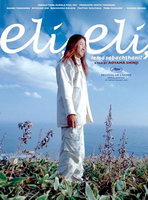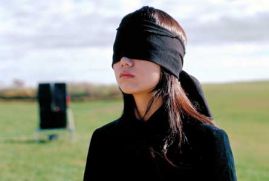
My God, My God, why hast thou forsaken me?
- MATTHEW 27:46
"I choose the camera and actors' placement based on some idea of spatial distance; and that distance is really all I am thinking about."
- Shinji Aoyama
Eli, Eli, Lema Sabachthani? (2005, Dir. Shinji Aoyama)He may only be known in the West (and just barely, at that) for his nearly four-hour-long opus
Eureka, but Shinji Aoyama deserves mention in the same breath with the New Wave of Japanese directors who have cornered the market on the Cinema of Unease. While other contemporaries such as Hideo Nakata (
Ringu) and Takashi Shimizu (
Ju-On: The Grudge) express their views on paranoia and alienation through the tried-and-true horror genre, Aoyama, like his mentor Kiyoshi Kurosawa (
Cure, Pulse) chooses more amorphous routes -- his films, with their dreamy juxtapositions of genre, mood, and tone, generate an almost narcotic effect: it might not make complete rational sense, but it's impossible to stop watching.
Eureka takes shocking, potentially exploitative incidents (a busjacking and serial murders) and refashions them into a quirky road trip that ends up being a head trip into the psyche of a battered family, and society. His latest film,
Eli, Eli Sabachthani (Aramaic for Christ's penultimate words on the cross -- see quotation above) works a similar kind of magic, bringing a hushed, almost diffident intensity to nothing less than the end of the world.
 |
The film opens with a shot of waves moving like molten lava; at an abandoned settlement on the seashore, noisepop musicians Mizui (the ubiquitous Tadanobu Asano) and Asuhara (real-life musician Masaya Nakahara) are scrounging for random items -- playing cards, vacuum tubes, empty shotguns. In the long, wordless passage that follows, moments where the two men experiment with the sounds of their newfound toys are juxtaposed with disturbing images of death: a glimpse of a lifeless leg in a doorway, a curtain with a bloody hole in its center flapping in the wind. From there the duo repair to their studio, where Mizui combines different lengths of tube with the skeleton of an umbrella to form an oscillating wave instrument. At this point, nearly twenty minutes into the film, no ostensible plot has been set in motion, and yet we are engrossed by the overall emotional effect, the bleak images of dead earth and abandoned shelters counterweighted by Mizui and Asuhara's matter-of-fact focus on their work, the process of making music holding the same power as a healing incantation.
 |
And then the plot kicks in: It is October 2015, and a new virus with the rather incongruous title of "lemming syndrome" is decimating the world. Described as "God's own suicide bomber," the disease drives those who are infected with it to commit suicide. In scenes that seem lifted from another movie entirely, a harder-than-hard-boiled detective (Masahiro Toda) is searching for the two musicians, with a millionaire (Yasutaka Tsutsui) and his infected granddaughter Hana (Aoi Miyazaki) in tow. After an interview with a senile scientist who spouts German, it is revealed that the only potential cure to the disease is the sonic noisepop experiments conducted by Mizui and Asuhara under their band name of Stepin Fetchit. And so the trio hop in a van and head for the seaside, not suspecting that the band's music may prove to be more dangerous than a simple cure.
With just a tweak, the scenario could have tipped over into pure parody (see Tim Burton's
Mars Attacks, wherein an annoying country ditty saves mankind). Kiyoshi Kurosawa would have attacked the horror angle, and invested the story with the crisp paranoia that permeates his movies. Aoyama prefers to play the scenario out as a particularly lucid dream, and as his essentially optimistic musicians interact with the suicidal girl and her grandfather, the digressions continue: Mizui creating a maelstorm with a single steel string connected to distortion and delay pedals, shots of Mizui and Asuhara ambling in a mini-car and bicycle through the empty countryside, and a flashback drenched in funereal blue hues in which Mizui's girlfriend falls prey to the disease. The fate of the planet isn't even part of the equation -- instead, the preoccupation is with individual human responses to the certainty of death, and how each of the players confronts the fact. In contrast to the Christian overtones suggested by the title, Aoyama posits a ministry of noise, in which instruments must be reduced to their guts and intestines (the vacuum tubes, a piano's innards), and the elegant tracking shots and piano interludes on the soundtrack are balanced by the liberating anarchy of Stepin Fetchit's sonic demolitions.
 |
Aoyama and his cinematographer Masaki Tamura bring an elegant intensity to the proceedings, and despite what some have said about a confusing plot,
Eli Eli actually contains a very simple throughline. More successful as a mood piece than a cogent assemblage of themes, the film is at its best when it's blissed out on noise, rather than engaging in story or characterization. None of the players are developed, and the film's ultimate message ("Just like music, you and I are but a dream") seems insubstantial compared to the musical and visual flights of fancy on display. Better to savor the film's climax, in which a blindfolded Hana, dressed in black, must find her "sweet spot" for sound in the midst of a lush green field, while Mizui, dressed in white, unleashes his final cure -- a guitar solo paroxysm that runs the gamut from speed shredding to reverb-drenched majesty, all rendered with every filmic trick Aoyama can pull out of his bag -- step frames, jitter cam, dreamy double exposures and dissolves. And even with these fireworks, Aoyama tops it with a fitting coda, a single shot of night descending on a seaside inn, Mizui settling down to sleep, the first few snowflakes of winter falling with the most genteel sound imaginable, the world fading into a midnight black of acceptance. Like most tone poems,
Eli Eli's protracted rhythms won't appeal to all audiences, but if you're willing to invest in the swirl of noise that gives the film its fuel and meaning, you'll likely find it as emotionally satisfying as a well-executed symphony -- no wherefores and hows necessary, only the enjoyment of the now.






1 Comments:
Great review. I loved this film. Shinji Aoyama is awesome.
Post a Comment
<< Home